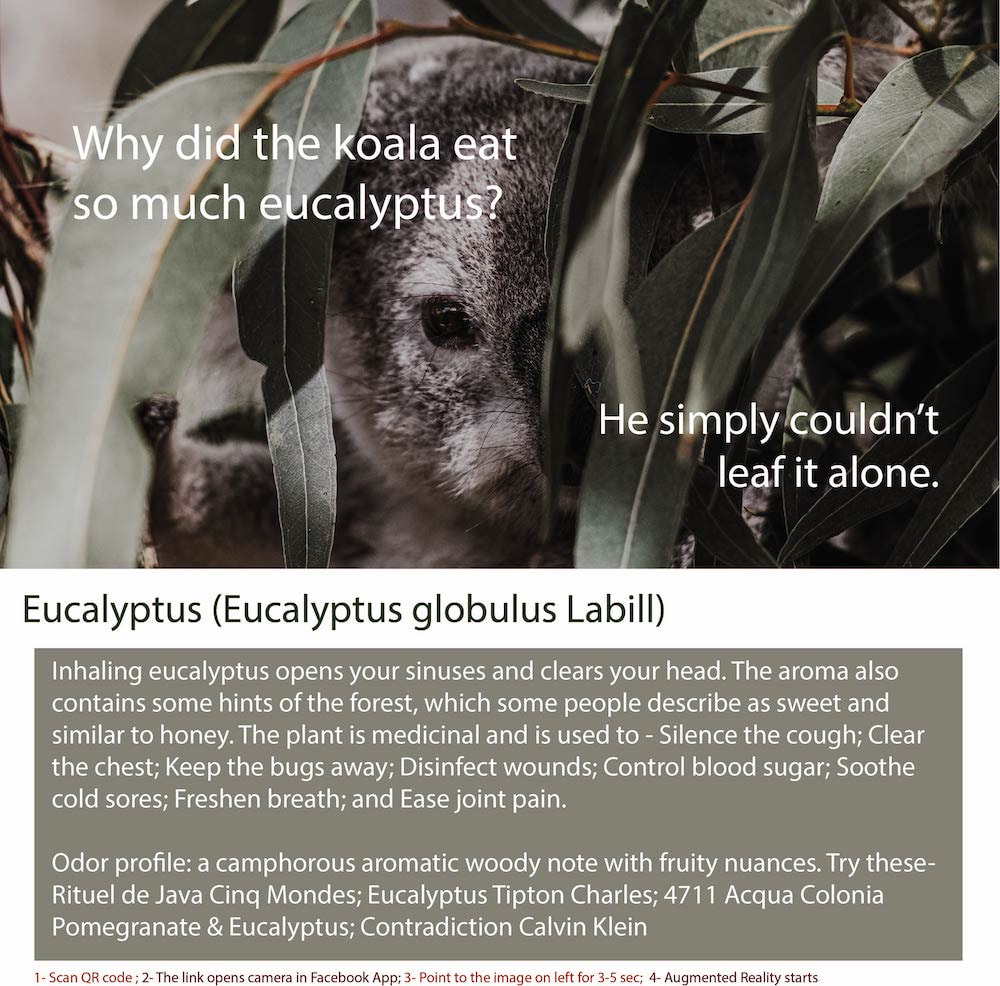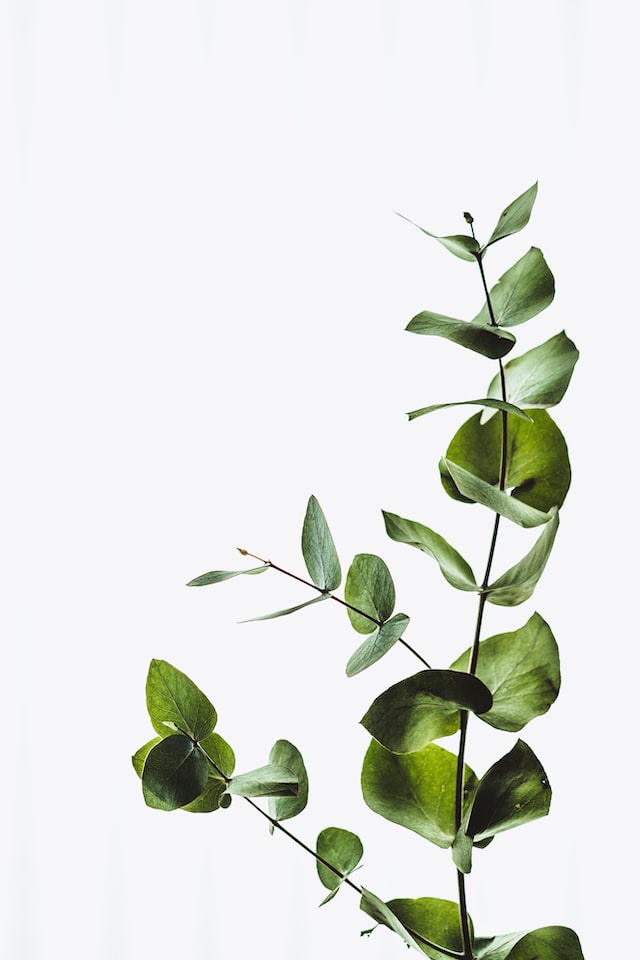Elevate Your Space with Invigorating Aromas
Eucalyptus: The Aromatic Wonder of Many Facets - From Perfumes to Fun Crazy Facts
Eucalyptus, a diverse and aromatic genus of trees and shrubs, is a true wonder of the plant kingdom. This versatile plant has found its place in a wide array of domains, including perfumes, fragrance, therapeutic oils, food, medicinal systems, history, and even fun crazy facts. In this article, we embark on a journey to explore the captivating allure of eucalyptus, uncovering its diverse uses and intriguing characteristics that have fascinated people around the world.
1. Eucalyptus in Perfumes and Fragrance
Eucalyptus's invigorating and refreshing aroma has inspired perfumers to incorporate its essence into fragrances. The essential oil extracted from eucalyptus leaves boasts a cool and minty scent that adds a touch of energy and vitality to perfumes. Eucalyptus extract is often used in fragrances that aim to evoke a sense of freshness and nature's embrace.
2. Eucalyptus in Therapeutic Oils
Eucalyptus essential oil is renowned for its therapeutic properties in aromatherapy. The oil is believed to have a clearing and decongestant effect on the respiratory system, making it a popular choice for relieving symptoms of colds and congestion. Additionally, eucalyptus oil is used for its potential to ease muscle pain and promote relaxation.
3. Eucalyptus in Culinary Delights
Eucalyptus leaves are occasionally used as a flavoring agent in certain culinary dishes and beverages. However, it is important to note that not all eucalyptus species are edible, and caution should be exercised when incorporating eucalyptus into food preparations.
4. Eucalyptus in Medicinal Systems
Eucalyptus has a long history of use in traditional medicine for its potential health benefits. Indigenous Australian communities used eucalyptus leaves to treat various ailments, including respiratory issues and skin conditions. Today, eucalyptus oil is commonly used in over-the-counter remedies such as chest rubs and cough drops.
5. Historical Significance of Eucalyptus
Eucalyptus is native to Australia and is considered an important part of the country's cultural heritage. The plant is also known for its rapid growth rate and ability to thrive in diverse environments, which has led to its widespread cultivation in other parts of the world.
6. Fun and Crazy Facts about Eucalyptus
a. Eucalyptus's Unique Bark: Eucalyptus trees are known for their distinctive and eye-catching bark, which often peels off in long strips, revealing smooth, multicolored patches.
b. Koala's Favorite Food: Eucalyptus leaves are the primary source of food for koalas, making them an essential part of the koala's diet.
c. Eucalyptus Oil and Insects: Eucalyptus oil is a natural insect repellent, making it a valuable tool for keeping pesky insects at bay.
d. The Blue Mountains: The Blue Mountains in Australia got their name from the bluish haze that results from the release of eucalyptus oil into the atmosphere.
e. Eucalyptus as a Renewable Resource: Eucalyptus trees are a sustainable and renewable resource, as they grow quickly and can be harvested for various purposes without causing significant environmental damage.
Eucalyptus, with its invigorating aroma and diverse applications, stands as an aromatic wonder cherished in perfumes, therapeutic oils, medicinal systems, and beyond. From its contributions to aromatherapy and respiratory health to its cultural significance and fun facts, eucalyptus continues to captivate and inspire. Whether it's infusing perfumes with a breath of fresh energy or providing relief from congestion and muscle discomfort, eucalyptus's allure lies in its versatility and the unique charm it brings to various aspects of human life. As we celebrate eucalyptus's contributions to our well-being and environmental sustainability, it stands as a testament to nature's abundant gifts and the profound impact of botanical wonders on our senses and daily experiences.
Eucalyptus, a diverse and aromatic genus of trees and shrubs, is a true wonder of the plant kingdom. This versatile plant has found its place in a wide array of domains, including perfumes, fragrance, therapeutic oils, food, medicinal systems, history, and even fun crazy facts. In this article, we embark on a journey to explore the captivating allure of eucalyptus, uncovering its diverse uses and intriguing characteristics that have fascinated people around the world.
1. Eucalyptus in Perfumes and Fragrance
Eucalyptus's invigorating and refreshing aroma has inspired perfumers to incorporate its essence into fragrances. The essential oil extracted from eucalyptus leaves boasts a cool and minty scent that adds a touch of energy and vitality to perfumes. Eucalyptus extract is often used in fragrances that aim to evoke a sense of freshness and nature's embrace.
2. Eucalyptus in Therapeutic Oils
Eucalyptus essential oil is renowned for its therapeutic properties in aromatherapy. The oil is believed to have a clearing and decongestant effect on the respiratory system, making it a popular choice for relieving symptoms of colds and congestion. Additionally, eucalyptus oil is used for its potential to ease muscle pain and promote relaxation.
3. Eucalyptus in Culinary Delights
Eucalyptus leaves are occasionally used as a flavoring agent in certain culinary dishes and beverages. However, it is important to note that not all eucalyptus species are edible, and caution should be exercised when incorporating eucalyptus into food preparations.
4. Eucalyptus in Medicinal Systems
Eucalyptus has a long history of use in traditional medicine for its potential health benefits. Indigenous Australian communities used eucalyptus leaves to treat various ailments, including respiratory issues and skin conditions. Today, eucalyptus oil is commonly used in over-the-counter remedies such as chest rubs and cough drops.
5. Historical Significance of Eucalyptus
Eucalyptus is native to Australia and is considered an important part of the country's cultural heritage. The plant is also known for its rapid growth rate and ability to thrive in diverse environments, which has led to its widespread cultivation in other parts of the world.
6. Fun and Crazy Facts about Eucalyptus
a. Eucalyptus's Unique Bark: Eucalyptus trees are known for their distinctive and eye-catching bark, which often peels off in long strips, revealing smooth, multicolored patches.
b. Koala's Favorite Food: Eucalyptus leaves are the primary source of food for koalas, making them an essential part of the koala's diet.
c. Eucalyptus Oil and Insects: Eucalyptus oil is a natural insect repellent, making it a valuable tool for keeping pesky insects at bay.
d. The Blue Mountains: The Blue Mountains in Australia got their name from the bluish haze that results from the release of eucalyptus oil into the atmosphere.
e. Eucalyptus as a Renewable Resource: Eucalyptus trees are a sustainable and renewable resource, as they grow quickly and can be harvested for various purposes without causing significant environmental damage.
Eucalyptus, with its invigorating aroma and diverse applications, stands as an aromatic wonder cherished in perfumes, therapeutic oils, medicinal systems, and beyond. From its contributions to aromatherapy and respiratory health to its cultural significance and fun facts, eucalyptus continues to captivate and inspire. Whether it's infusing perfumes with a breath of fresh energy or providing relief from congestion and muscle discomfort, eucalyptus's allure lies in its versatility and the unique charm it brings to various aspects of human life. As we celebrate eucalyptus's contributions to our well-being and environmental sustainability, it stands as a testament to nature's abundant gifts and the profound impact of botanical wonders on our senses and daily experiences.
To experience augmented reality, please open the Facebook-app using QR code and point to the image below
Unwind with the Natural Home Fragrance of Eucalyptus
Eucalyptus is a genus of trees and shrubs in the family Myrtaceae, native to Australia and neighboring islands. Eucalyptus trees are known for their tall, straight trunks and fragrant leaves, which are often used in essential oils and other products. Some species of eucalyptus are also used for timber and as ornamental plants. They also have medicinal properties, are used as a source of food and shelter for wildlife, and as landscape trees.
Eucalyptus fun facts
- Eucalyptus trees can grow up to 100 feet tall, making them one of the tallest trees in the world.
- The name "eucalyptus" comes from the Greek words "eu," meaning "well," and "kaluptos," meaning "covered," referring to the cap that covers the flower buds.
- Eucalyptus leaves are known for their strong, distinct aroma, which is used in many products such as essential oils, cough drops, and cleaning supplies.
- Some species of eucalyptus trees can release a chemical called eucalyptol, which can help to repel insects and other pests.
- Eucalyptus trees have a unique method of seed dispersal called "masting," where they release large quantities of seeds at infrequent intervals.
- Eucalyptus leaves are also used as a food source for certain animals, such as koalas, which are native to Australia and rely almost exclusively on eucalyptus leaves for their diet.
- In addition, Eucalyptus oil is also used to cure respiratory issues and has strong antiseptic properties.
Refresh Your Senses with Strong Fresh Aqua Scent
Eucalyptus is a genus of trees and shrubs that is native to Australia. Koalas are marsupials that primarily eat the leaves of eucalyptus trees. Eucalyptus leaves are toxic to most animals, but koalas have evolved to be able to digest them. The eucalyptus leaves provide the koalas with all the nutrients they need to survive. Eucalyptus leaves are also important for the koalas as they are a source of moisture during dry periods.
Koalas are marsupials that are native to Australia. They are known for their fuzzy ears and their sleepy, relaxed demeanor. They primarily eat eucalyptus leaves, which provide them with all the nutrients they need to survive. Koalas are also known for their distinctive vocalizations, which they use to communicate with other koalas. They are marsupials and have a pouch in which they carry their young. Koalas are considered as vulnerable species due to habitat loss, disease and bushfires, population is decreasing.
Koalas are marsupials that are native to Australia. They are known for their fuzzy ears and their sleepy, relaxed demeanor. They primarily eat eucalyptus leaves, which provide them with all the nutrients they need to survive. Koalas are also known for their distinctive vocalizations, which they use to communicate with other koalas. They are marsupials and have a pouch in which they carry their young. Koalas are considered as vulnerable species due to habitat loss, disease and bushfires, population is decreasing.
Eucalyptus Fragrance Oil: Nature's Aromatic Blessing
Eucalyptus is a genus of trees and shrubs that is native to Australia. The eucalyptus tree has been a part of the Australian landscape for thousands of years, and has a long history of use by Indigenous Australians.
The first recorded European discovery of eucalyptus trees was made by the explorer George Bass in 1797. However, it wasn't until the early 19th century that eucalyptus began to be widely cultivated outside of Australia. The first eucalyptus trees were brought to Europe in the 1820s by the French botanist Charles-Louis L'Héritier de Brutelle, who was impressed by their fast growth and potential as a timber tree.
In the 1850s, eucalyptus trees were introduced to California as a potential source of timber. They quickly became popular for their fast growth and ability to thrive in dry, marginal land. Eucalyptus trees were also introduced to other parts of the world, including South Africa, Brazil, and India, where they were used primarily for their ability to provide quick and efficient reforestation.
Eucalyptus oil, which is derived from the leaves of the eucalyptus tree, has also been used for medicinal purposes for centuries. The oil was first used by Indigenous Australians as a treatment for a variety of ailments, and was later adopted by Europeans for its decongestant and expectorant properties.
Today, eucalyptus is widely cultivated around the world for a variety of purposes, including as a source of timber, for use in paper production, and for its potential medicinal properties.
The first recorded European discovery of eucalyptus trees was made by the explorer George Bass in 1797. However, it wasn't until the early 19th century that eucalyptus began to be widely cultivated outside of Australia. The first eucalyptus trees were brought to Europe in the 1820s by the French botanist Charles-Louis L'Héritier de Brutelle, who was impressed by their fast growth and potential as a timber tree.
In the 1850s, eucalyptus trees were introduced to California as a potential source of timber. They quickly became popular for their fast growth and ability to thrive in dry, marginal land. Eucalyptus trees were also introduced to other parts of the world, including South Africa, Brazil, and India, where they were used primarily for their ability to provide quick and efficient reforestation.
Eucalyptus oil, which is derived from the leaves of the eucalyptus tree, has also been used for medicinal purposes for centuries. The oil was first used by Indigenous Australians as a treatment for a variety of ailments, and was later adopted by Europeans for its decongestant and expectorant properties.
Today, eucalyptus is widely cultivated around the world for a variety of purposes, including as a source of timber, for use in paper production, and for its potential medicinal properties.
Creating a Relaxing Atmosphere with Strong Fresh Aqua Scent
Eucalyptus, the leaf and oil of which is derived from the eucalyptus tree, has been used for medicinal purposes for centuries. Some potential health benefits of eucalyptus include:
- Respiratory health: Eucalyptus oil is often used as a decongestant and expectorant to help relieve symptoms of colds, flu, and respiratory infections.
- Pain relief: Eucalyptus oil has anti-inflammatory and pain-relieving properties that may help alleviate muscle and joint pain.
- Antibacterial and antiviral properties: Eucalyptus oil has been shown to have antimicrobial properties, which may help to prevent the growth of bacteria and viruses.
- Wound healing: Eucalyptus oil may help to promote wound healing by reducing inflammation and stimulating blood flow to the affected area.
- Improved mental clarity: Eucalyptus oil has been used to help improve concentration and focus, and to reduce feelings of anxiety and stress.
Experience the Essence of Eucalyptus Fragrance Oil
Eucalyptus oil is often used as an ingredient in perfumes and other fragrances because of its fresh, invigorating scent. The oil is extracted from the leaves of the eucalyptus tree, and is known for its woody, medicinal aroma.
In perfumes, eucalyptus oil is often used to create a fresh and clean scent, and is often combined with other essential oils such as lemon, peppermint, and rosemary to create a refreshing and invigorating aroma.
Eucalyptus oil is also used in other fragranced products such as candles, room sprays, and air fresheners.
It's important to note that due to the strong, pungent and medicinal scent of eucalyptus oil, it's often used in small amounts or in combination with other fragrances, to create a balanced and pleasant scent.
Eucalyptus oil is also used in perfumery to create different olfactive families, for example in the creation of "fougère" fragrances, eucalyptus can bring a unique freshness to the perfume.
Here is a list of perfumes that feature eucalyptus as a prominent note:
In perfumes, eucalyptus oil is often used to create a fresh and clean scent, and is often combined with other essential oils such as lemon, peppermint, and rosemary to create a refreshing and invigorating aroma.
Eucalyptus oil is also used in other fragranced products such as candles, room sprays, and air fresheners.
It's important to note that due to the strong, pungent and medicinal scent of eucalyptus oil, it's often used in small amounts or in combination with other fragrances, to create a balanced and pleasant scent.
Eucalyptus oil is also used in perfumery to create different olfactive families, for example in the creation of "fougère" fragrances, eucalyptus can bring a unique freshness to the perfume.
Here is a list of perfumes that feature eucalyptus as a prominent note:
- Jo Malone London Eucalyptus: This scent features a blend of eucalyptus, lemon, and rosemary to create a refreshing and invigorating aroma.
- Le Labo Eucalyptus: This scent features a blend of eucalyptus, cedar, and rosewood to create a woody and medicinal aroma.
- Atelier Cologne Eucalyptus: This scent features a blend of eucalyptus, bergamot, and juniper berries to create a fresh and clean aroma.
- Maison Martin Margiela Replica Eucalyptus: This scent features a blend of eucalyptus, lemon, and rosemary to create a refreshing and invigorating aroma.
- L'Artisan Parfumeur Eucalyptus: This scent features a blend of eucalyptus, lavender, and rosemary to create a fresh and clean aroma.
- Le Couvent Des Minimes Eucalyptus: This scent features a blend of eucalyptus, lemon and mint to create a refreshing and invigorating aroma.
- Penhaligon's Eucalyptus: This scent features a blend of eucalyptus, peppermint and rosemary to create a refreshing and invigorating aroma.
Join Scentopia, Sentosa's latest tourist attraction wonderful orchid scent crafting, fragrance tour, bridal shower or corporate team building which includes perfume making onsite and offsite, beach activities and more. We also serve primary school learning journey, secondary students and pupil on industrial excursions. Know more about our orchids perfume bar or therapeutic orchid scents and other wellness aromas. Conatct Perfume workshop or book a scent crafting session here.






